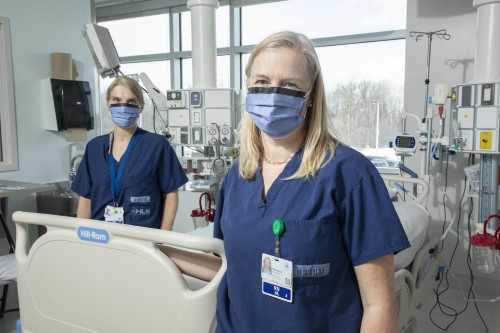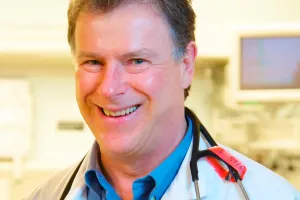Giving every COVID-19 patient the chance to participate in research
 Since the beginning of the pandemic, Irene Watpool (left) and Rebecca Porteous have been on the front lines explaining all the available COVID-19 clinical trials to patients and their families. Most patients admitted to The Ottawa Hospital with COVID-19 have probably met Irene Watpool or Rebecca Porteous, even if they don't remember it. Since the beginning of the pandemic, Irene and Rebecca have been on the front lines explaining all the available clinical trials to these patients and their families, often during those first difficult days of hospitalization.
Since the beginning of the pandemic, Irene Watpool (left) and Rebecca Porteous have been on the front lines explaining all the available COVID-19 clinical trials to patients and their families. Most patients admitted to The Ottawa Hospital with COVID-19 have probably met Irene Watpool or Rebecca Porteous, even if they don't remember it. Since the beginning of the pandemic, Irene and Rebecca have been on the front lines explaining all the available clinical trials to these patients and their families, often during those first difficult days of hospitalization.
"We meet these patients at an incredibly stressful time, when they are suddenly very sick and worried about the future," said Irene "Not only that, we're asking them to make quick decisions about participating in research, as these experimental treatments are more likely to help if we start them early."
Thankfully, Rebecca and Irene are used to having these difficult conversations with patients and their families, as they are normally responsible for coordinating and managing clinical research in the ICU. When the pandemic arrived in Ottawa, they volunteered to make sure that the hospital's COVID-19 patients in all units were informed about ongoing COVID-19 trials. Every day they review what studies are recruiting, and decide which patients on the hospital wards or the ICU might benefit from this potentially life-saving research.
Irene and Rebecca also play an important role in making sure patients aren't overwhelmed by their research options.
"We didn't want a patient to be approached by multiple investigators at different times about different projects," said Rebecca. "Based on our experience in the ICU, it was better that Irene or I tell COVID-19 patients about all the studies available to them. If they agree to participate, then we relay their decisions to the research teams."
In addition to donning the necessary protective equipment before entering patient rooms, the research coordinators need to memorize the details of multiple studies because they can't bring any written material into patient rooms. They also need to find creative ways to help patients discuss whether to participate in research with family members, who often can't be in the room with them.
Irene notes that most patients with COVID-19 have agreed to participate in research, despite the discomfort of extra tests, blood work or nasal swabs.
"I feel privileged to be involved in this," said Irene. "These patients are being very altruistic. You really have a sense they don't wish the disease on anyone and they're willing to help."
Irene and Rebecca have gone above and beyond to make sure that all hospitalized patients with COVID-19 have the chance to participate in research. Even though Ottawa has been fortunate to have fewer COVID-19 cases and hospitalizations compared to other parts of the country, the hospital has remained one the highest recruiting sites in Canada for several national and international studies. This important contribution is largely due to the tireless work of research staff like Irene and Rebecca.
"It's so important that we give our patients every opportunity to participate in research," said Dr. Shane English, intensive care physician and associate scientist at The Ottawa Hospital and assistant professor at the University of Ottawa. "When we think of front-line heroes in this pandemic, we should definitely also think of people like Irene and Rebecca. Thanks to their efforts, patients with COVID-19 are contributing to solving this global problem."
Some of the studies that Irene and Rebecca recruited patients for have already borne fruit. Interim results from an international clinical trial show that blood thinners can help keep hospitalized COVID-19 patients out of the ICU. These findings have already changed practice at The Ottawa Hospital, and could potentially reduce the burden on intensive care units around the world. In addition, an experimental stem cell therapy for severely ill COVID-19 patients has recruited enough people to complete the first phase of the study. Also, a global effort to determine if blood plasma from people who have recovered from COVID-19 could be an effective treatment found it had no benefit.
"It has been busy, that's for sure," said Irene. "There are many studies to keep on top of. But I've really enjoyed working with all the different research groups, as well as with patients and their families. Overall, it's been a very positive experience."
People interested in taking part in research should speak to their health-care provider and agree to be contacted for research purposes when registering for appointments. More information can be found on the hospital's Ask me about our research page.
The Ottawa Hospital is a leading academic health, research and learning hospital proudly affiliated with the University of Ottawa.
Media Contact
Amelia Buchanan
Senior Communication Specialist
Ottawa Hospital Research Institute
613-297-8315
ambuchanan@ohri.ca
Learn more about:
The Ottawa Hospital is a leading academic health, research and learning hospital proudly affiliated with the University of Ottawa and supported by The Ottawa Hospital Foundation.


